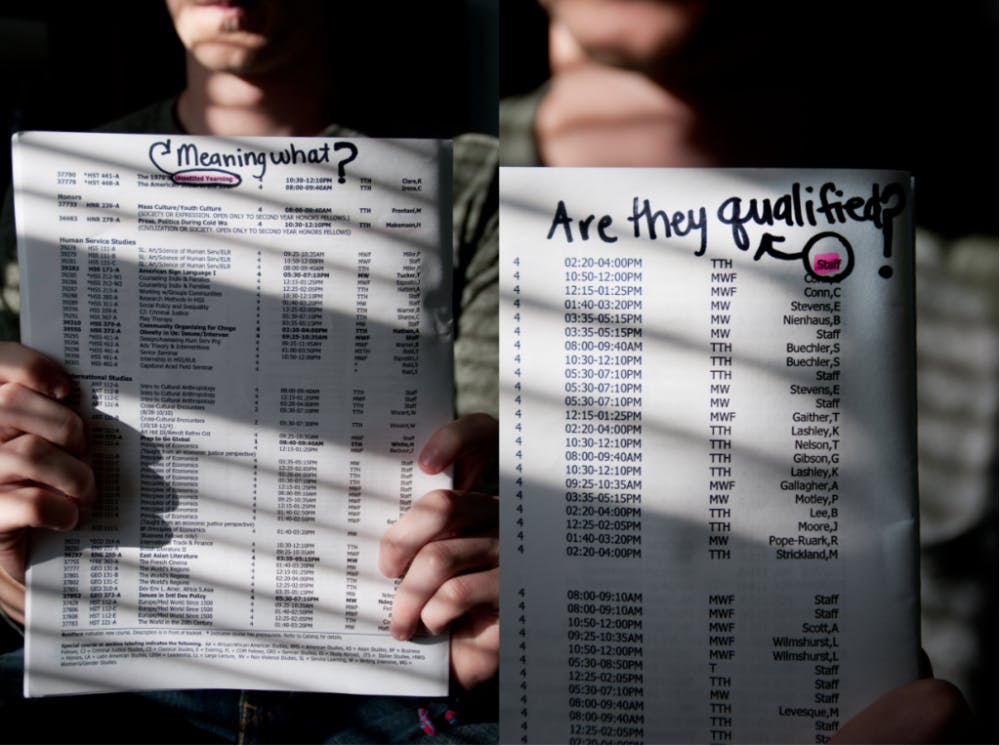Besides OnTrack, there is one site that students frequent during the hectic time of class registration. RateMyProfessors.com may be outdated and characterized by polarizing reviews of professors around the country, but it’s one that students have come to rely on for the important decision of selecting courses.
[quote]If students had the option of viewing a candid, but fair, evaluation of their impending professors, it would allow them to make better decisions about their education.[/quote]
Last November, The Pendulum informed you about the redesign of the course evaluation process, finalized by a group within Academic Council. Renamed “Student Perceptions of Teaching,” the new process placed emphasis on gauging a student’s engagement with the course as well as the option for faculty to include questions personalized for each course. In no way are we questioning the anonymity, validity or benefits of such a system for the good of the faculty, staff and administration at Elon.
But what good does it do for the students of Elon University if those evaluations are kept behind closed doors, only to be viewed by department chairs and passed along to professors? What good does it do if students cannot hold their professors and the administration accountable when classes are not taught effectively?
The bland, brief descriptions available in the course catalogue tell students nothing about the personality, teaching method or expertise of a professor. This leads to students increasingly turning to unreliable websites, such as RateMyProfessors, for analyses that are often less than respectable.
While it’s not always feasible within a particular major to pick and choose professors, seeing real feedback about a course is an option that should at least be readily available so students have an idea of what they should be expecting before the start of a semester. If several semesters of evaluations show that a course simply isn’t working, students should be able to address this concern directly, using examples of student feedback to make a case for change.
[box][poll id="10"][/box]
When we are paying upwards of $1,600 per credit hour, depending on course load, we should also be proactive during the semester.
Instead of waiting until evaluation time to write scathing reviews of professors who did not perform to our utmost satisfaction, we should take advantage of the opportunity to address issues directly mid-semester.
Elon’s Center for the Advancement of Teaching and Learning (CATL) offers faculty the option for a third party to conduct an anonymous mid-semester evaluation. The professor leaves and a faculty member from CATL spends time discussing the class with students. Feedback is then transcribed and given anonymously to the professor.
This method should be used more frequently, and students should encourage faculty members to seek this kind of honest, useful feedback.
Take, for example, the Global Experience course, required for all first year students. Although there is a relatively unifying theme to all of the sections of this course, there is no guarantee the professor will follow the expected structure. Within one group of freshmen, the experience in the course can vary between a professor who lectures the entire class time and assigns a paper each night to another professor who shows a movie every class.
If students had the option of viewing a candid, but fair, evaluation of their impending professors, it would allow them to make better decisions about their education.
Students, this doesn’t mean you should get a free pass to bash your hardest professor in order to discourage other students from enrolling in his or her class. Rather than writing about your most negative experience with a professor, be constructive, tactful and fair in your analysis. And be honest. Perhaps explain some of your own personal weaknesses or shortcomings that could have affected your classroom experience. Share some of the positive interactions you had with the instructor.
The Pendulum is not calling for a website where professors should be blasted for every misstep they've ever made in the classroom.
But, through a joint effort of transparency from the university and tactful evaluation from the students, we believe the academic life of the university will be greatly enhanced.


